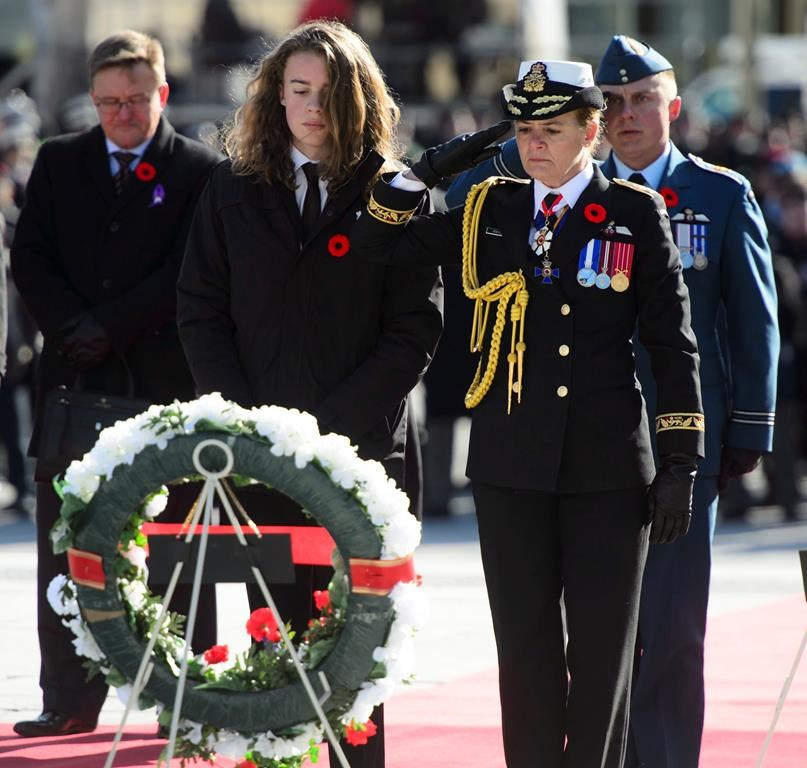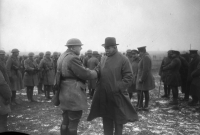Support strong Canadian climate journalism for 2025
Canada has missed an opportunity to mark the 100th anniversary of the First World War with efforts that fell far short of those in allied countries, several historians say.
"I think the government of Canada botched the commemoration of the First World War," said author and military historian Jack Granatstein, a former head of the Canadian War Museum. "Other than the Vimy Ridge celebration in 2017, I think they have done a very bad job."
This past Remembrance Day marked not only the centenary of the armistice that ended the First World War, but also the conclusion of four years of commemorations around the world to learn about and remember the "War to End All Wars."
While the war cost the lives of more than 60,000 Canadians, it also had significant and lasting impacts on Canada's political, social, economic and cultural landscape, such as the rise of Quebec nationalism, women's suffrage and more autonomy from Britain.
Veterans Affairs Canada says it has spent $13 million since 2014 on different events commemorating the war, with most of the money dedicated to last year's high-profile ceremony for the 100th anniversary of the battle of Vimy Ridge. That was a large event: More than 24,000 people attended.
But the British government set the standard when it budgeted 100 million pounds, or about $170 million, for ceremonies, BBC documentaries, school visits to battlefields, museum refurbishments and other programs about the war.
Several other countries also organized signature events and educational programming, with New Zealand setting aside at least $20 million and Australia budgeting nearly $80 million.
"We had this one event at Vimy," said Mark Humphries, an expert on the First World War at Wilfrid Laurier University. "Australia has focused so much on both Gallipoli as well as what happened to them on the Western front. Lots of documentaries, miniseries and other stuff focused on it. And in many ways Canada's kind of been on the sidelines for a lot of this."
Veterans Affairs contends that it wasn't sitting on its thumbs over the past four years. Ten large-scale public events were held in Canada and overseas, a spokesman said, while TV and internet advertising reached millions of Canadians.
More than four million books, pamphlets and other pieces of learning material were also distributed each year to schools, youth organizations and community groups.
Still, a glance at the Veterans Affairs website in recent weeks showed that the vast majority of events leading up to the 100th anniversary of the end of the war were organized not by the department but by individual communities and organizations.
One of the most active communities was the small town of Cobourg, Ont., about an hour east of Toronto, where a play about a trial involving Canada's top general from the war served as the foundation for weeks of larger commemorations.
"What has been put together is the largest commemoration of the armistice in all of Canada here in Cobourg," Mayor Gil Brocanier. "There has been a long history of interest and support for people who have served our country."
The government announced last week that Cobourg would get $10,000 from a fund established to support commemorative projects in local communities. Veterans Affairs did not say how much money had been distributed through the fund.
There have been other projects as well. Vimy Foundation executive director Jeremy Diamond said his organization received $5 million for a new education centre at Vimy that opened last year, as well as money for a book of colourized photos from the war.
Yet while he feels it would have been unreasonable to expect a budget like Britain's, and his organization is grateful for the funding it did receive, Diamond worries the only "legacy project" from the centenary is the Vimy centre.
"It seems like it was geared locally more than nationally with local events in communities," he said. "The challenge is (smaller projects) will often benefit the local community and a smaller group of people, but that sort of signature legacy project ... is what really helps educate and engage young Canadians."
Historians are divided over why the government took the approach it did.
The Conservatives under Stephen Harper launched the First World War commemorations to great fanfare in 2014 after making a big deal of the 200th anniversary of the War of 1812, and were the ones who promised the Vimy Foundation money for the new visitor centre. But some say the Conservatives didn't start the planning needed years before the commemorations, to begin work on documentaries and other large projects.
Others wonder whether the messy story of Canada's experience in the First World War, when conscription for a war in Europe threatened to tear the country apart and left lasting divisions, particularly in Quebec, made the government leery about making too much noise about the conflict.
Whoever is to blame, University of Calgary historian David Bercuson said there's no denying that it was a "missed opportunity," lamenting: "When are we ever going to celebrate the 100th anniversary of the armistice again?"





Comments
Mr. Trudeau went through the motions but how sincere was he. In the lead up to the federal election who knows?